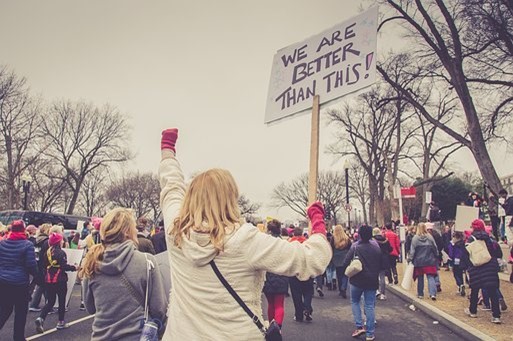- Hyderally & Associates P.C | Employment Lawyers NJ, NY
- (973) 509-8500
- tyh@employmentlit.com
Can My Employer Really Fire Me for Protesting?
New Rules in Sight for New Jersey Family Leave
April 12, 2021NJLAD Preempted by the FAA: What Does This Mean for Employees?
April 14, 2021By: Jennifer Vorih, Esq., and Ty Hyderally, Esq.
2020 was a very tumultuous year, and 2021 started off with a violent insurrection. Many employers terminated employees who participated in the January 6, 2021 insurrection at the United States Capitol. Others have been terminated for protesting or taking other actions with which their employers do not want to be associated. While many observers feel that people espousing white supremacy and promoting violence deserve to be fired, others wonder if it is legal to terminate employees for those reasons, or for demonstrating in support of Black Lives Matter. The answer, generally, is yes.

In New Jersey, most workers are “at will” employees, meaning that employers can fire them for no reason or for any reason at all, as long as it is not an illegal reason. For instance, it is illegal in New Jersey to terminate an employee due to race, gender, disability, sexual orientation, or religion. New Jersey law also prohibits firing employees for complaining about discrimination, asking for an accommodation for a disability, or blowing the whistle on company actions which violate the law or a rule or regulation promulgated pursuant to law, or which violate public policy.
But What About the First Amendment? The First Amendment to the United States Constitution is recognized as protecting freedom of speech, so many people mistakenly think this means they cannot get fired for exercising their freedom of speech. However, the First Amendment does not prohibit private employers from terminating employees for speaking out, whether it be against police brutality or for white supremacy. The First Amendment provides that, “Congress shall make no law respecting an establishment of religion, or prohibiting the free exercise thereof; or abridging the freedom of speech, or of the press; or the right of the people peaceably to assemble, and to petition the Government for a redress of grievances.” Thus, the First Amendment does not prohibit private employers from taking action against employees for exercising their right to free speech. It should be noted, though, that New Jersey employees are protected by the New Jersey Conscientious Employee Protection Act and the New Jersey Law Against Discrimination for speaking out about discrimination and other illegal activities in the workplace.
But What About Public Employers? The First Amendment does offer some protection to public employees who protest. Public employers may be prohibited from firing workers who speak out, but only if the employees speak out about matters of public concern, and in their role as private citizens, rather than in their role as public employees. If public employees do speak out as private citizens, regarding matters of public concern, their employer can only fire them if the government’s interest in efficiently fulfilling its public services outweighs the public employee’s free speech interests. Thus, a police officer may have job protection when speaking out as a private citizen about a variety of public issues, but not when storming the United States Capitol, as doing so would certainly undermine the police department’s role in maintaining order and safety.
But What About Unemployment? It may be of interest that, for the most part, employees in New Jersey who are terminated due to participating in protests would be eligible for unemployment compensation. However, in the very unlikely scenario in which the employer has a valid policy prohibiting employees from participating in protests, doing so may be deemed misconduct, if the employee knowingly violated the policy. If a New Jersey applicant for unemployment compensation is found to have been terminated due to misconduct, this will result in a delay of six weeks in receiving benefits.
The bottom line is that while New Jersey employees are free to speak their minds, New Jersey employers, for the most part, are free to terminate them for doing so.
En nuestra firma hablamos español. This blog is for informational purposes only. It does not constitute legal advice, and may not reasonably be relied upon as such. If you face a legal issue, you should consult a qualified attorney for independent legal advice with regard to your particular set of facts. This blog may constitute attorney advertising. This blog is not intended to communicate with anyone in a state or other jurisdiction where such a blog may fail to comply with all laws and ethical rules of that state of jurisdiction.

